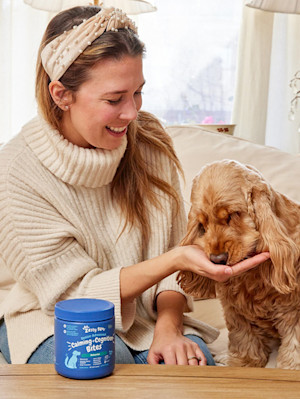Should You Give Your Dog Cranberry Supplements?
Learn what the benefits are.

Share Article
In This Article:
Can Dogs Eat Cranberries? Is Cranberry Good for Dogs? Cranberry Supplements Health Benefits for Dogs Risks of Cranberry Supplements for Dogs
Did you know that dogs can get UTIs (urinary tract infections) just like people? While most dogs go through life without having any urinary issues, others can be predisposed to UTIs due to anatomical abnormalities, bladder stones, or neurological issues. Cranberries are often suggested for UTI prevention in people, so should they be part of UTI care for dogs as well?
Can dogs eat cranberries?
An example question: My dog gets UTIs at least once a year. She’s otherwise healthy and stays in great spirits most of the time, but these episodes make her miserable. She always responds well to antibiotics, but I’d like to do more to save her from the discomfort that comes with each infection. Can dogs eat cranberries to help with UTIs?

Before exploring if cranberries or cranberry supplements are helpful in treating or preventing UTIs in dogs, it’s helpful to know if cranberries are even safe for dogs to eat. After all, many foods that people enjoy, such as grapes, raisins, chocolate, onions, garlic, and macadamia nuts, are toxic to dogs.
Cranberries in all forms — fresh, dried, juice, extract — are non-toxic to dogs. That’s not to say that you can go ahead and feed your dog a bunch of cranberries without causing problems, but the fruit has no direct toxic effects on dogs. Convincing a dog to eat a cranberry may be difficult though. Dogs aren’t big fans of sour foods, and the tart, acidic flavor of cranberries should be off-putting to most.
Fortunately for pet parents interested in providing their UTI-prone dogs with the potential benefits of cranberries, there are cranberry supplements available as tablets and pills in pet stores and online. These may be easier to convince dogs to eat, depending on their vigilance about finding pills in treats.
Is cranberry good for dogs?
Cranberries are relatively high in carbohydrates (sugars), but they do contain a high concentration of vitamin C, as well as antioxidants like quercetin and proanthocyanidin (PAC). Those PACs have some interesting effects that explain the use of cranberries in preventative dog UTI medicines.
In general, dogs don’t need cranberries in their diet unless specifically recommended by a veterinarian. There’s no harm in giving your dog a little bit of cranberry if they enjoy it, but cranberries should not make up a significant portion of your dog’s diet. Any nutrient source that’s not your dog’s normal food should be kept to less than ten percent of their daily calorie intake to prevent nutritional imbalances.
Cranberry supplements health benefits for dogs
Can cranberries actually calm dog UTI symptoms? Not really. Cranberries are included in supplements for urinary health because they’re high in PACs. PACs are antioxidants that affect the ability of E. coli to attach to cells lining the bladder wall. This makes it harder for them to establish an infection.
Cranberry supplements may be helpful in preventing some UTIs, but they don’t work as a treatment for established infections. E. coli are the most commonly isolated bacteria in canine bladder infections, but they only cause about half of cases overall. Other types of bacteria aren’t affected by PACs in the same way, so cranberry wouldn’t help prevent infection with those bacteria.
The evidence supporting the use of cranberry supplements in both human and canine research is somewhat shaky. Two veterinary products (Crananidin and Paxon) were evaluated in small studies. The study of Crananidin showed that the PACs in the product created enough active metabolites in the urine of dogs to reduce E. coli adhesion. The study of Paxon showed a 30 percent reduction in E. coli adhesion after 30 days. Both of these studies relied on in vitro testing to show their benefit. Real-life effects has not been proven at this time.
So, should your dog be on a cranberry supplement? It’s something to discuss with your vet. The supplements are unlikely to cause much harm (except to your bank account) and may help prevent infections if your dog has recurrent issues with E. coli UTIs. Despite their apparent safety, cranberry supplements may not be the right choice for every dog with a UTI though. Cranberries can have some unexpected drawbacks.
Risks of cranberry supplements for dogs
Cranberry supplements could potentially cause problems for some dogs. Cranberry is a urinary acidifier, so it should be used with caution in dogs that have a history of either calcium oxalate or urate bladder stones. Cranberries are also high in oxalates, making them doubly risky for dogs predisposed to forming calcium oxalate stones.
Eating a large amount of cranberry or cranberry supplements can cause signs of stomach upset, like loss of appetite, vomiting, and diarrhea. Some cranberry products — including supplements, juice, and jellies — may contain xylitol, which is toxic to dogs. Always check the ingredients before giving any new products to your dog.
While a little taste of jellied cranberry at Thanksgiving shouldn’t cause your dog harm, don’t be tempted to add a big slice to their bowl. The canned sauce has a good bit of corn syrup added to it, making it a sugar bomb that your dog doesn’t need.
Bottom line
Urinary tract infections can be painful for dogs and frustrating for dog parents, especially when they’re recurrent. Cranberry supplements that are high in proanthocyanidin antioxidants may help prevent UTIs caused by E. coli, but evidence for this is weak.
If your dog has frequent problems with UTIs, talk to your vet before starting a cranberry supplement to make sure that you’re giving a high-quality product that is right for your dog’s needs. Your vet may also have other recommendations to prevent UTIs, such as regular grooming, treatment of allergies, increased water consumption, or surgery to correct anatomical abnormalities.
References
Howell, A. B., D. W. Griffin, and M. O. Whalen. "Inhibition of p-fimbriated Escherichia coli adhesion in an innovational ex-vivo model in dogs receiving a bioactive cranberry tablet (CrananidinTM)." J Vet Int Med Abstract 24 (2010): 678.
Olby, N J et al. “Effect of Cranberry Extract on the Frequency of Bacteriuria in Dogs with Acute Thoracolumbar Disk Herniation: A Randomized Controlled Clinical Trial.” Journal of veterinary internal medicine vol. 31,1 (2017): 60-68. doi:10.1111/jvim.14613opens in new tab.
Olin, Shelly J., and Joseph W. Bartges. "Urinary tract infections treatment/comparative therapeutics." Veterinary Clinics: Small Animal Practice 52.3 (2022): 581-608.
Smee, N., G. F. Grauer, and T. Schermerhorn. "Investigations into the effect of cranberry extract on bacterial adhesion to canine uroepithelial cells." J Vet Intern Med 25 (2011): 716.
Weese, J Scott et al. “Antimicrobial use guidelines for treatment of urinary tract disease in dogs and cats: antimicrobial guidelines working group of the international society for companion animal infectious diseases.” Veterinary medicine international vol. 2011 (2011): 263768. doi:10.4061/2011/263768opens in new tab.
Wong, C et al. “Antimicrobial Susceptibility Patterns in Urinary Tract Infections in Dogs (2010-2013).” Journal of veterinary internal medicine vol. 29,4 (2015): 1045-52. doi:10.1111/jvim.13571opens in new tab.

Dr. Bartley Harrison, DVM
Dr. Bartley Harrison is a veterinarian with more than 19 years of experience. He has treated a variety of species in emergency and speciality practices for both large and small animals. His primary interests as a vet are emergency medicine and critical care.
Related articles
Why Is My Dog Peeing So Much?
Seriously, when will it end?
Why Does My Dog Smell Like Fish?
It’s not a very pleasant odor, to say the least.
![Tan Chihuahua dog laying on aqua rug looking down shamefully]()
“Why Is My Adult Dog Peeing in The House?”
How to re-housetrain a dog of any age.
![collage of dog food toppers on blue background]()
9 Food Toppers That Will Make Your Dog Actually Want to Eat Dinner
If your dog suffers from mealtime boredom, spice up their food bowl with one of these tasty toppers.
Why Does My Puppy Pee on My Bed?
And when will it stop?
![dog near pee spot on carpet]()
How to Remove Dog Pee and Other Stains From Carpet—Without Harsh Chemicals
The next time your dog pees on your favorite rug, be prepared with this simple, three-step method.








